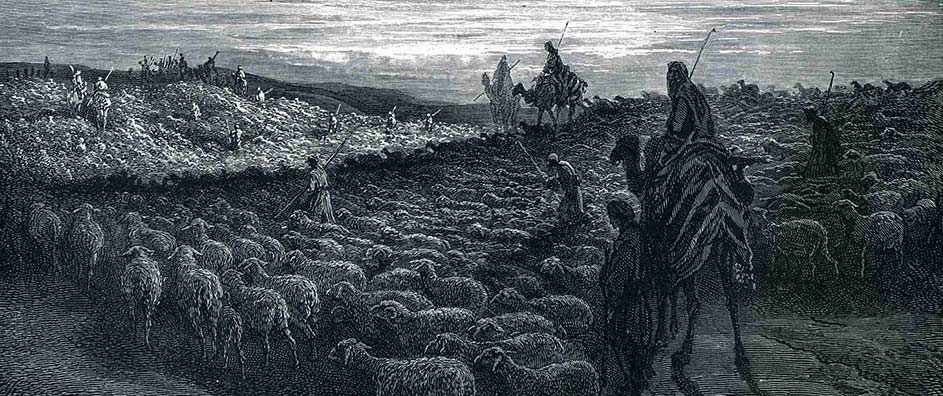The narrative of Abraham, a pivotal figure in the Bahá’í Faith, encompasses themes of faith, persecution, and divine reliance. Central to this discussion is how Abraham, believed to be the first monotheist, faced banishment for his unwavering belief in one God. His life and trials offer profound insights into the nature of belief, the consequences of faith, and the universal quest for truth.
Abraham’s story begins in the ancient city of Ur, located in present-day Iraq. This environment, steeped in polytheistic traditions, was not conducive to the revolutionary ideas that Abraham proclaimed. He challenged the prevailing idolatry, which inevitably incited hostility among his contemporaries. Abraham’s rejection of multiple deities in favor of a singular divine entity marked him as an outlier, leading to increasing animosity from his own community. His declaration of faith became a source of contention, culminating in profound personal sacrifices.
In examining the circumstances of his banishment, it becomes imperative to understand the sociopolitical climate of Ur. The resistance he faced was not merely ideological; it was deeply woven into the fabrics of power and social order. The ruling elite, whose authority rested upon the established religious practices, viewed Abraham’s teachings as an existential threat. Consequently, his exile serves as a poignant illustration of the perilous intersection between spiritual conviction and societal norms.
Abraham’s journey represents a transformative pilgrimage, both physically and spiritually. After his banishment, he traveled to places such as Haran and eventually to Canaan, each location embodying new beginnings and further trials. Within the Bahá’í context, these travels symbolize the soul’s quest for enlightenment and unity with the divine. The act of walking away from familiar territory signifies not only a physical departure but also a profound metaphysical leap into the unknown, an essential component of spiritual growth.
This narrative resonates with the Bahá’í teachings on the nature of divine messengers. Abraham is often regarded as a forerunner of later prophetic figures, each tasked with delivering a fragment of divine revelation suited to their time. The Bahá’í perspective emphasizes that Abraham’s role was instrumental in preparing humanity for the later teachings of subsequent prophets, thus portraying his banishment as part of a divine plan that ultimately aimed at fostering unity among diverse peoples and religious traditions.
A pivotal aspect of Abraham’s story is his unwavering faith amid adversity. The trials he endured mirror the universal challenges faced by individuals who seek to uphold their beliefs in the face of opposition. His determination to persevere illustrates the quintessential virtues lauded within the Bahá’í teachings, such as patience, steadfastness, and the pursuit of truth. By embodying these traits, Abraham serves as a paragon of virtue for adherents of the Bahá’í Faith, highlighting the necessity of resilience in the spiritual journey.
Moreover, the banishment of Abraham highlights the theme of personal sacrifice present in many religious narratives. In his case, it was not merely his physical expulsion from Ur, but also the emotional and relational sacrifices he made in pursuing his belief in God. This aspect invites contemplation on the moral and ethical dimensions of faith. It raises questions about the lengths to which individuals must go to adhere to their convictions and the potential ramifications of such choices on their lives and the lives of others. The sacrifices made by Abraham serve as a microcosm of the broader struggles faced by believers throughout history.
In the broader context of Bahá’í teachings, Abraham’s story is intricately linked to the concept of divine justice and mercy. His banishment, while a source of personal suffering, also situates him within a narrative that underscores the ultimate triumph of truth over falsehood. The Bahá’í Faith posits that divine justice does not merely represent punishment but encompasses a broader understanding of balance, compassion, and the eventual rectification of wrongs. Thus, Abraham’s tribulations can be viewed as integral to the unfolding of a larger divine narrative focused on the redemption and spiritual evolution of mankind.
Furthermore, the intergenerational impact of Abraham’s journey cannot be understated. His legacy continues to influence millions, bridging cultural and religious divides. This aspect is particularly significant in the Bahá’í Faith, which advocates for the oneness of humanity. The teachings surrounding Abraham exemplify the profound interconnectedness among diverse religious traditions. His life story is not merely a historical account but serves as a living testament to the enduring power of faith to transcend temporal and cultural boundaries.
In conclusion, the narrative of “Abraham: Banished for Believing in God” encapsulates deep themes of faith, sacrifice, and resilience. His journey from Ur to Canaan is emblematic of the broader human experience in the quest for truth and divine purpose. For adherents of the Bahá’í Faith, Abraham’s story is a source of inspiration, reflecting the fundamental tenets of sacrifice, steadfastness in conviction, and the overarching narrative of divine justice. Ultimately, Abraham serves not only as a historical figure but as a model for contemporary seekers of truth, embodying the universal struggles and triumphs that define the human condition.
